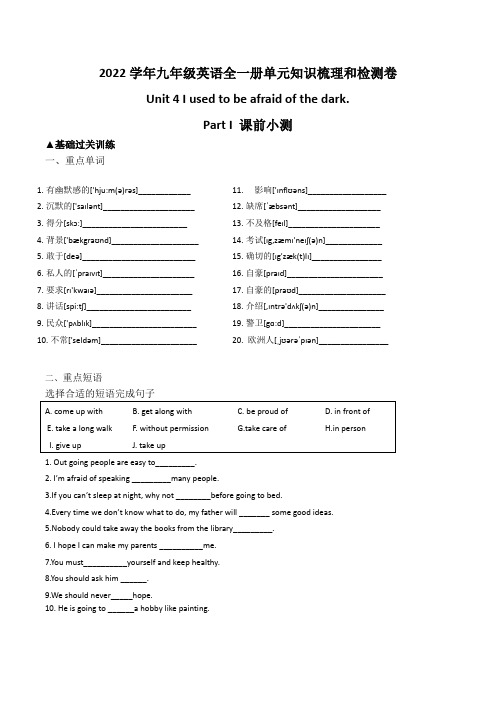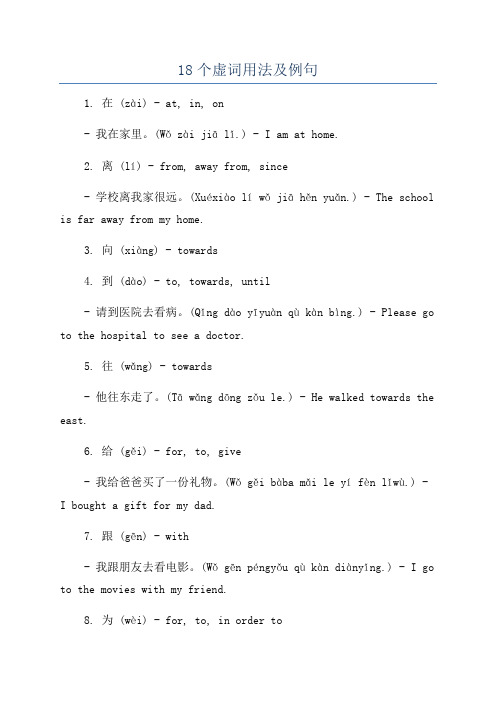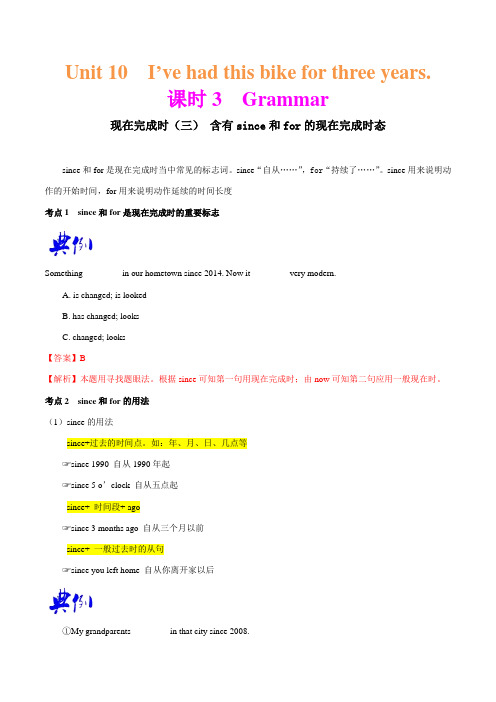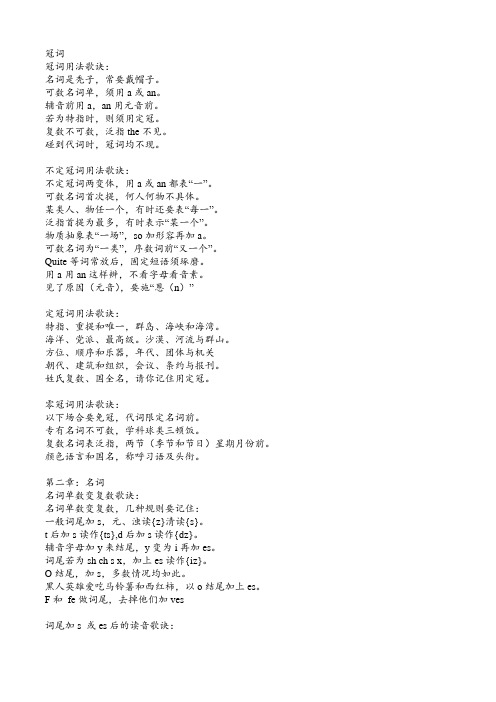zsince的用法
外研社九年级上册英语-Module-2-词汇与语法基础(解析版)-(2)

精品文档-可编辑一、必背词汇f o u n d[f aʊn d]v.创立,创建f l a g[f læg]n.旗,旗帜u n t i l[ənˈtɪl]p r e p.&c o n j.直到…为止o f f[ɒf]a d v.不上课,休息,不工作v a c a t i o n[vəˈk eɪʃn]n.假期,假日s e a s o n[ˈs i:z n]n.度假旺季,节期k i d[kɪd]n.小孩b a n d[bæn d]n.乐队U K[ˌj u:'k eɪ]英国f o u r t h[fɔ:θ]n u m.第四s i x t h[sɪk sθ]n u m.第六s e v e n t h[ˈs e v nθ]n u m.第七e i g h t h[eɪtθ]n u m.第八n i n t h[n aɪnθ]n u m.第九t e n t h[t e nθ]n u m.第十t w e l f t h[t w e l fθ]n u m.第十二t w e n t i e t h['t w e n tɪəθ]n u m.第二十a m o n g[əˈmʌŋ]p r e p.在…之中s p e e c h[s p i:tʃ]n.演说,讲演p i o n e e rˌ[p aɪəˈnɪə]n.开拓者,先驱者g r o w[g rəʊ]v.种植,栽培(植物)c o r n[kɔ:n]n.谷物,玉米f o l l o w i n g[ˈfɒləʊɪŋ]a d j.接着的,接下来的l a y(l a i d,l a i d)[l eɪ]v.摆放(餐桌)o v e r[ˈəʊvə]a d j.完了的,结束的d i s h[dɪʃ]n.盘,碟p a r a d e[pəˈr eɪd]n.(庆祝)游行o u r s e l v e s[ɑ:ˈs e l v z]p r o n.我们自己二、重点词汇1.f o u n d[f aʊn d]v.t o b r i n g s o m e t h i n g i n t o e x i s t e n c e创建;创立;创办例句:R o m e w a s f o u n d e d i n t h e e i g h t h c e n t u r y B C.罗马是公元前8世纪创建的。
2022学年九年级英语全一册单元知识梳理和检测卷Unit4Iusedtobeafraidofthed

2022学年九年级英语全一册单元知识梳理和检测卷Unit 4 I used to be afraid of the dark.Part I 课前小测▲基础过关训练 一、重点单词二、重点短语1. Out going people are easy to_________.2. I’m afraid of speaking _________many people.3.If you can’t sleep at night, why not ________before going to bed.4.Every time we don’t know what to do, my father will _______ some good ideas.5.Nobody could take away the books from the library_________.6. I hope I can make my parents __________me.7.You must__________yourself and keep healthy.8.You should ask him ______.9.We should never_____hope.10. He is going to ______a hobby like painting.1. 有幽默感的['hjuːm(ə)rəs]____________2. 沉默的['saɪlənt]_____________________3. 得分[skɔː]________________________4. 背景['bækgraʊnd]____________________5. 敢于[deə]__________________________6. 私人的[ˈpraɪvɪt]_____________________7. 要求[rɪ'kwaɪə]______________________8. 讲话[spiːtʃ]________________________9. 民众['pʌblɪk]________________________ 10. 不常['seldəm]______________________ 11. 影响['ɪnflʊəns]__________________ 12. 缺席[ˈæbsənt]___________________ 13. 不及格[feɪl]_____________________ 14. 考试[ɪg,zæmɪ'neɪʃ(ə)n]_____________ 15. 确切的[ɪg'zæk(t)lɪ]________________ 16. 自豪[praɪd]______________________ 17. 自豪的[praʊd]____________________ 18. 介绍[,ɪntrə'dʌkʃ(ə)n]_______________ 19. 警卫[gɑːd]______________________ 20. 欧洲人[ˌjʊərəˈpɪən]________________【知识点汇总】1. use v.&n.使用;用途eful有用的反义词useless无用的( )例题1. --- How does Jack usually go to school?--- He_____ride a bike,but now he_____there to lose weight.A. used to;is used to walkB.was used to;is used to walkingC.was used to;is used to walked to;is used to walking2.反意疑问句(1)肯定陈述句+否定提问(可记为前肯后否)Lily is a student,isn’t she?Lily will go to China,won’t she?(2)否定陈述句+肯定提问(可记为前否后肯)She doesn’t come from China,does she?You haven’t finished homework,have you?(3)反意疑问句的答语如果答语是肯定的,用“Yes+肯定结构”;如果答语是否定的,用“No+否定结构”①如果反意疑问句中的陈述部分为肯定定句时,Yes译为“是”,No译为“不” --- He enjoys singing,doesn’t he?他喜欢唱歌,是吗?--- Yes,he does./No,he doesn’t.是的,他喜欢。
18个虚词用法及例句

18个虚词用法及例句1. 在(zài) - at, in, on- 我在家里。
(Wǒ zài jiā lǐ.) - I am at home.2. 离(lí) - from, away from, since- 学校离我家很远。
(Xuéxiào lí wǒ jiā hěn yuǎn.) - The school is far away from my home.3. 向(xiàng) - towards4. 到(dào) - to, towards, until- 请到医院去看病。
(Qǐng dào yīyuàn qù kàn bìng.) - Please go to the hospital to see a doctor.5. 往(wǎng) - towards- 他往东走了。
(Tā wǎng dōng zǒu le.) - He walked towards the east.6. 给(gěi) - for, to, give- 我给爸爸买了一份礼物。
(Wǒ gěi bàba mǎi le yí fèn lǐwù.) -I bought a gift for my dad.7. 跟(gēn) - with- 我跟朋友去看电影。
(Wǒ gēn péngyǒu qù kàn diànyǐng.) - I go to the movies with my friend.8. 为(wèi) - for, to, in order to- 我为了考试而学习。
(Wǒ wèi le kǎoshì ér xuéxí.) - I study for the exam.9. 对(duì) - towards, to, with regard to- 他对我很友好。
牛津译林版八年级英语下册全册词汇、句型、语法知识点及训练汇总

牛津译林版八年级英语下册Unit 1 Past and present词汇、句型、语法知识点及训练知识精讲一、必背词汇past n. 过去adj.过去的present n. 现在,目前just adv. 刚才since conj. 自……以来prep.自……以来ever adv. 曾经northern adj. 北方,北部的married adj. 已婚的,结婚的wife n.(pl. wives) 妻子block n.街区over prep. 在……期间pollution n. 污染;污染物factory n. 工厂waste n. 废料;废品realize (= realise )vt.& vi.意识到;实现improve vt.&vi. 改进,改善situation n. 形势,情况impossible adj. 不可能的before adv.以前,过去lonely adj. 孤独的,寂寞的anyway adv. 尽管,即使这样husband n. 丈夫interview n. 采访;会见yet adv. 还,仍recently adv.近来,最近environment n. 环境transport n.交通车辆,运输工具condition n. 环境,条件,状况return vi. 返回last adv.最近,上一次;最后abroad adv. 到(在)国外primary adj. 小学教育的;初级的communicate vt. &vi. 交流,交际exactly adv.(答语)正是,没错narrow adj. 狭窄的二、重点词汇1. present noun /ˈprez.ənt/1). something that you are given, without asking for it, on a special occasion, especially to showfriendship, or to say thank you(尤指表示友谊或致谢的)礼物,赠品例句:They gave me theatre tickets as a present.他们送给我戏票作为礼物。
专题10.3 Grammar--八年级英语人教版(下册)培优讲义含答案

Unit 10 I’ve had this bike for three years.课时3 Grammar现在完成时(三)含有since和for的现在完成时态since和for是现在完成时当中常见的标志词。
since“自从……”,for“持续了……”。
since用来说明动作的开始时间,for用来说明动作延续的时间长度考点1 since和for是现在完成时的重要标志Something ________ in our hometown since 2014. Now it ________ very modern.A. is changed; is lookedB. has changed; looksC. changed; looks【答案】B【解析】本题用寻找题眼法。
根据since可知第一句用现在完成时;由now可知第二句应用一般现在时。
考点2 since和for的用法(1)since的用法since+过去的时间点。
如:年、月、日、几点等☞since 1990 自从1990年起☞since 5 o’clock 自从五点起since+ 时间段+ ago☞since 3 months ago 自从三个月以前since+ 一般过去时的从句☞since you left home 自从你离开家以后①My grandparents ________ in that city since 2008.A. will liveB. liveC. have livedD. were living【答案】C【解析】句意:我的祖父母从2008年就生活在哪个城市里。
since+过去的时间点是现在完成时的标志。
②I'm looking after Tom today. He's been in my house ________ 8:00 this morning.A. atB. sinceC. forD. till【答案】B【解析】句意:我今天一直在家照看汤姆。
高考英语高频介词(带音标全)

高考英语高频介词(带音标全)高考英语高频介词(带音标全)介词的作用介词是英语中非常重要的一种词类,用来描述名词或代词与其他词语之间的关系。
在高考英语中,介词的使用频率非常高,掌握常用的介词及其用法对于理解和运用英语具有重要意义。
常用介词列表下面是高考英语中常用的介词及其音标:- about /əˈbaʊt/ 关于- above /əˈbʌv/ 在...之上- across /əˈkrɔ:s/ 穿过- after /ˈæftə(r)/ 在...之后- against /əˈɡenst/ 反对- along /əˈlɔŋ/ 沿着- among /əˈmʌŋ/ 在...之中- around /əˈraʊnd/ 在...周围- as /əz/ 作为- at /æt/ 在...地方- before /bɪˈfɔ:/- behind /bɪˈhaɪnd/- below /bɪˈloʊ/- beside /bɪˈsaɪd/- between /bɪˈtwi:n/- beyond /bɪˈjɑ:nd/- but /bət/- by /baɪ/- concerning /kənˈsɜ:r.nɪŋ/- considering /kənˈsɪd.ə.rɪŋ/ - despite /dɪˈspaɪt/- down /daʊn/- during /ˈdʊr.ɪŋ/- for /fɔ:r/- from /frʌm/- in /ɪn/- inside /ɪnˈsaɪd/- into /ˈɪn.tu/- like /laɪk/- of /əv/- off /ɔ:f/- on /ɑ:n/- onto /ˈɑ:n.tu/- out /aʊt/- outside /aʊtˈsaɪd/- over /ˈoʊ.vɚ/- past /pæst/- regarding /rɪˈɡɑ:r.dɪŋ/- round /raʊnd/- since /sɪns/- through /θru:/- throughout /θ- to /tu:/- toward(s) /təˈwɔ:rd.z/ /təˈwɔ:rd/ - under /ˈʌn.dɚ/- underneath /ˌʌn.dɚˈniːθ/- until /ənˈtɪl/- up /ʌp/- upon /əˈpɑ:n/- with /wɪθ/- within /wɪˈθɪn/- without /wɪˈðaʊt/小结以上是高考英语中常用的介词及其音标。
用法歌诀

冠词冠词用法歌诀:名词是秃子,常要戴帽子。
可数名词单,须用a或an。
辅音前用a,an用元音前。
若为特指时,则须用定冠。
复数不可数,泛指the不见。
碰到代词时,冠词均不现。
不定冠词用法歌诀:不定冠词两变体,用a或an都表“一”。
可数名词首次提,何人何物不具体。
某类人、物任一个,有时还要表“每一”。
泛指首提为最多,有时表示“某一个”。
物质抽象表“一场”,so加形容再加a。
可数名词为“一类”,序数词前“又一个”。
Quite等词常放后,固定短语须琢磨。
用a用an这样辨,不看字母看音素。
见了原因(元音),要施“恩(n)”定冠词用法歌诀:特指、重提和唯一,群岛、海峡和海湾。
海洋、党派、最高级。
沙漠、河流与群山。
方位、顺序和乐器,年代、团体与机关朝代、建筑和组织,会议、条约与报刊。
姓氏复数、国全名,请你记住用定冠。
零冠词用法歌诀:以下场合要免冠,代词限定名词前。
专有名词不可数,学科球类三顿饭。
复数名词表泛指,两节(季节和节日)星期月份前。
颜色语言和国名,称呼习语及头衔。
第二章:名词名词单数变复数歌诀:名词单数变复数,几种规则要记住:一般词尾加s,元、浊读{z}清读{s}。
t后加s读作{ts},d后加s读作{dz}。
辅音字母加y来结尾,y变为i再加es。
词尾若为sh ch s x,加上es读作{iz}。
O结尾,加s,多数情况均如此。
黑人英雄爱吃马铃薯和西红柿,以o结尾加上es。
F和fe做词尾,去掉他们加ves词尾加s 或es后的读音歌诀:轻音{s} 元、浊{z},“四十七”后读{iz}以f、fe结尾的复数名词:树叶(leaf)半数(half)自己(Self)黄,妻子(wife)拿刀(knife)去割粮,架(shelf)后窜出一只狼(wolf),就像强盗(thief)逃命(life)忙。
以f结尾的直接加s变复数:是信念鼓励海湾的农奴首领,从峭壁跳到屋顶,从保险柜里寻找证据(8个)The belief encouraged the chief of the serfs from the gulf to jump from the cliff onto the roof to search for the proof in the safe.“某国人”变复数歌诀:复数词形不难记,中日不变英法变。
外研版八年级英语下Module 4单词、知识梳理

外研版八年级英语下Module 4单词、知识梳理01 Moudle 4 单词【重点单词】1. cough [kɒf]咳嗽(n.);咳嗽(v.)2. fever ['fi:və(r)]发烧;发热3. headache [ˈhedeɪk]头痛4. stomach ['stʌmək]腹部;肚子5. ache [eɪk]痛;疼痛6. stomach ache牙痛7. ill [ɪl]不健康的;有病的8. this [ðɪs]这,这个(刚提到的人或物)9. since [sɪns]自…以来;从…以来10. cold [kəʊld]感冒;伤风11. catch a cold[kætʃ]感冒12. take [teɪk](用机器)测定,量取;有规律的吃、喝13. take sb. temperature[ˈtemprətʃə(r)]量某人的体温14. fast food[fu:d]快餐食品15. health [helθ]健康(状况)16. well [wel]健康的17. heart [hɑ:t]心脏18. active [ˈæktɪv]积极的;活跃的19. pet [pet]宠物;宠畜20. member [ˈmembə(r)]成员;会员21. take part in参加,参与(某事)22. condition[kənˈdɪʃn]状况;身体状况23. in excellent condition[ˈeksələnt]健康状况很好24. sleepy['sli:pɪ]想睡的;困的25. then [ðen]当时;那时26. daily ['deɪlɪ]每天的;天天的27. weak[wi:k]弱弱的;虚弱的28. illness[ˈɪlnɪs]病;疾病29. exercise ['eksəsaɪz]运动;锻炼30. awful [ˈɔ:fl]极讨厌的;极坏的31. feel awful感到不舒服32. all over浑身;到处33. perhaps [pəˈhæps]可能;也许Moudle4课文视频外研版八年级下册Module 4 Unit 1 课文动画外研版八年级下册Module 4 Unit 2 课文动画Moudle 4知识梳理【重点短语】1. catch a cold / have a cold 感冒catch a cold 侧重患感冒的动作,属于短暂性动词短语have a stomach ache胃痛have a bad cold 重感冒have a cough咳嗽have a fever 发烧have a toothache 牙疼have a headache头痛2. do much exercise 经常性的锻炼do sports 做运动3. be harmful to 对......有害be helpful to 对….有好处be good to 对…友好be bad to 对…..不友好be good for 对….有好处be bad for 对…..有坏处4. such as 例如for example例如5. three times a say 一天三次6.spend in doing sth 花时间做某事7. take one’s temperature 量体温8. fast food 快餐9. in front of 在......前面10. look after 照顾,照料11. take sb for a walk 带某人散步12. feel bit/ health 感觉健康13. by underground 乘地铁on the underground14. ride to work 骑车去上班15. decide to do sth 决定做某事16. take part in 参加17. in the last few years 在过去的几年里18. be too+形容词+to do sth 太......不能做......19. from time to time 不时地20. set up 建立21. be ill 生病feel ill 感觉生病了22. go for a run 去散步23. feel awful 感觉不舒服24. all over 浑身; 遍及25. rather than (与其...)倒不如;是...而不是26. turn off 关掉27. have a pain in... (某身体部位)疼痛【重点句型】1. Now I get exercise by taking him for a walk every day. 现在每天通过带它去散步我得到了锻炼。
- 1、下载文档前请自行甄别文档内容的完整性,平台不提供额外的编辑、内容补充、找答案等附加服务。
- 2、"仅部分预览"的文档,不可在线预览部分如存在完整性等问题,可反馈申请退款(可完整预览的文档不适用该条件!)。
- 3、如文档侵犯您的权益,请联系客服反馈,我们会尽快为您处理(人工客服工作时间:9:00-18:30)。
• 1.He has never been to see me since I have been ill. • 2. He has never been to see me since I was ill.
• 1.自从我生病以来,他从未来看过我。 • 2.自从我病愈以来,他从未来看过我。
由此可见,since引导的从句持续动词的一般 过去时和现在完成时所表示的意思恰好相反。 换言之,前者以肯定的语法形式反映着否定 的逻辑内容,而后者的形式与内容是一致的。
• Since we have owned a car, we have gone camping every year。 • 自从我们自己有了汽车,我们每年都去野 营。
试比较:
• 1. Since I’ve been at this school, we have had three headmasters . • 2.Since I was at this school, they have had three headmasters. • 1.自从我到这所学校,我们已换了三个校长 了。 • 2.自从我离开这所学校,他们已换了三个校 长了。
三、若since引导的状语从句的谓语为持 续性动词的现在完成时,则表示从动作和 状态发生延续到现在(说话时刻)。
• I haven’t heard from him since he has lived there。 • 这里has lived表示动作的持续性,时间的 起点应从:“开始居住”时算起。 • 因此此句可理解为“自从他(开始)住在 那儿起,我就一直没收到他的来信”。
• Eg:He has studied very hard since he came to our school. • 一、若since引导的状语从句的谓语动词是终止性 的过去时,则从句表示的时间是“从动作开始的 那一时刻起”。 • 自从他来到我们学校,他学习就非常努力。 • 自从他们离开这里,我们就一直很想念他们 • We have been missing them since they left here
区别瞬间动词和延续性动词
瞬间动词:发生的时间短暂,不能和延续性 的时间词连用。 如:buy, close 延续性动词: 动作可以延续,或者就是一个 状态。如:be, keep, stay 我买这本书3年了。 I have had the book for 3 years. Mary的爷爷从2010年去世至今。 Mary’s grandpa has been dead since 2010
这种译法常被人们误用,我们不妨 再多举几个例子看看 :
• It is half a month since he was a student. • 他已经不是学生半个月了。 • It’s been quite a long time since I was last in London . • 我离开伦敦已很长时间了。
举例比较
• 1.He has written to me frequently since I was ill. • 2.He has written to me frequently since I fell ill. • 句1从句谓语动词为状态动词 • 句2从句谓语动词为终止性动词 • 自从我病愈以来,他屡次给我写信。 • 自从我生病以来,他屡次给我写信。
选用for、since填空
1. We haven’t seen each other for ____ a long time. since10 2. His father has been in this factory _____ years ago. for 10 minutes. 3. The film has been on ____
since 4. Mr. Smith has worked here ______he came to China. for several 5. His grandpa has been dead ___ years.
Think it over!Are they right?
我买这本书3年了。 I have bought the book for 3 years. X Mary的爷爷从2010年去世至今。 Mary’s grandpa has died since 2010 X
for 和sinceyears 3 minutes 2002 May 5th 2 months
for +段时间,表示持续了多久 I have been a teacher for 10 years.
since+过去的某个点时间,表示自从..时候起 I have been a teacher since 2010. I have been a teacher since he left Zhuzhou.
• 句型I:“It is (has been)+时间+since+持 续性动词的过去时”,表示“自从……以来 到现在已有多久。” It has been quite some time since I was last in London. 我上次离开伦敦至今颇有一段时间了。 • 句型II:“It was+时间+since+持续性动词的 过去完成时”,表示“从……到过去某时间点 以来”, • It was three years since we had been here. • 那时我们在这已呆了三年。
since的用法
• • • • since的用法主要有两点: 一是表示“自从……以来” 二是表示“既然”之意 Eg:I have not heard from him since I lived in Shanghai. • 错误翻译为:自从我住在上海以来,就再 也没有收到他的信了 。
since作连词引导时间状语从句的用 法
come/go – be (in /at) I have been in Zhuzhou for …. buy – have I have had the book for… borrow – keep I have kept the book for…. die – be dead He has been dead for… become – be I have been a teacher for… marry – be married They have been married for… open – be open The door have been open for….
二、若since引导的状语从句的谓语动 词是持续性动词或表示状态的动词的过 去时时,则从句表示的时间是“从那持 续动作结束或状态结束时算起”。 • I haven’t heard any noise since I slept. • Sleep 为持续性动词,sleep的动作 结束时,即“醒来” • 这句应译为“我醒后还未听到任何声 音”。
John is now with his parents in New York, it is already three years since he was a teacher
• 约翰现在和父母一起住在纽约,他不当教 师已经三年了。 • I have not heard from him since I lived in Shanghai. • 自从我离开(没住在)上海,就再也没有收 到他的信 。
转换
Translation
• 我借他的书有2个月了。 • 自从10年前,Tom 已经来了株洲。 • 他买这本书1年了。 • 从2010年起,他已经是个有名的歌手了。
